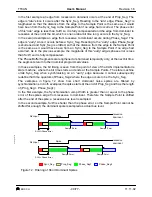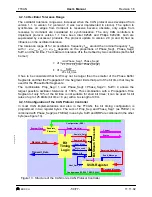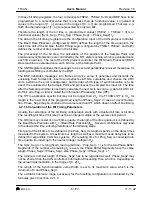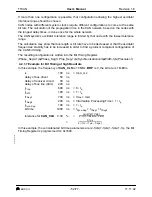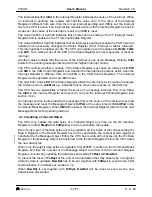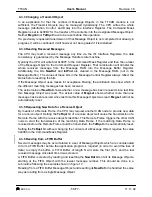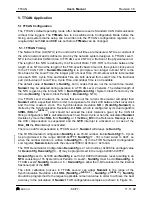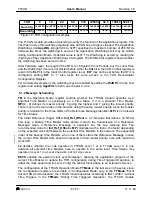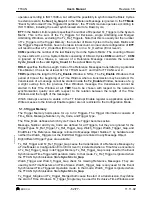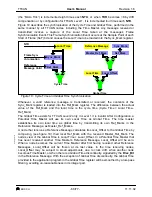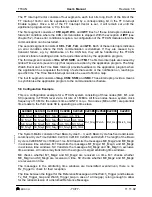
User’s Manual
BOSCH
- 56/77 -
Revision 1.6
TTCAN
11.11.02
manual_about.fm
‘0’), it is programmed to ID28 - ID18, ID17 - ID0 can then be disregarded. When a Remote
Frame with an 11-bit Identifier is received, ID17 - ID0 will be set to ‘0’.
The Data Length Code (DLC3-0) may be given by the application. When the Message Handler
stores a Remote Frame in the Message Object, it will store the received Data Length Code.
The data bytes of the Message Object will remain unchanged.
If the RxIE bit is set, the IntPnd bit will be set when a received Remote Frame is accepted and
stored in the Message Object.
4.3 CAN Communication
When the initialisation is finished, the TTCAN module synchronises itself to the traffic on the
CAN bus. It does an acceptance filtering on received messages and stored those frames that
are accepted into the designated Message Objects. The application program has to update
the data of the messages to be transmitted and has to enable and request their transmission.
The transmission is requested automatically when a matching Remote Frame is received or in
time triggered communication.
The application program reads messages that are received and accepted. Messages that are
not read before the next messages is accepted for the same Message Object will be
overwritten. The Message Objects of a FIFO buffer need to be read and cleared before the
next batch of messages can be stored. Depending on the configuration, the messages may be
read interrupt-driven, after polling of NewDat, or time triggered.
If one of the Interface Register sets is used only for reading of received messages its
Command Mask Register may be kept constant at 0x7F, meaning that always the whole
Message Object is transferred into the Interface Register set; NewDat and IntPnd are reset.
To update the data bytes of a message to be transmitted, the Command Mask Register should
be set to 0x87 (all transmit messages in C_CAN emulation mode or event triggered message
in arbitrating time window) or to 0x83 (time triggered message in exclusive time window).
Note : After the update of the Transmit Object, the Interface Register set will contain a copy of the
actual contents of the object, including the part that had not been updated.
4.3.1 Handling of Interrupts
The TTCAN module provides several interrupt sources which share a common interrupt line.
The common interrupt line to the CPU can be enabled/disabled by IE. The module’s interrupt
sources can be enabled/disabled separately, by the TT Interrupt Enable Register, by the CAN
Control Register bits SIE and EIE, or by the RxIE and TxIE bits of each Message Object. The
source of a pending interrupt is shown by the CAN Interrupt Register.
The Status Interrupt and the TTCAN Interrupt have the highest priority. Among the message
interrupts, the Message Object’ s interrupt priority decreases with increasing Message
Number.
If several interrupts are pending, the CAN Interrupt Register will point to the pending interrupt
with the highest priority, disregarding their chronological order. An interrupt remains pending
until the CPU has cleared it.
A message interrupt is cleared by clearing the Message Object’s IntPnd bit. The Status
Interrupt is cleared by reading the Status Register. The TTCAN Interrupt is cleared by reading
the TT Interrupt Vector Register.








